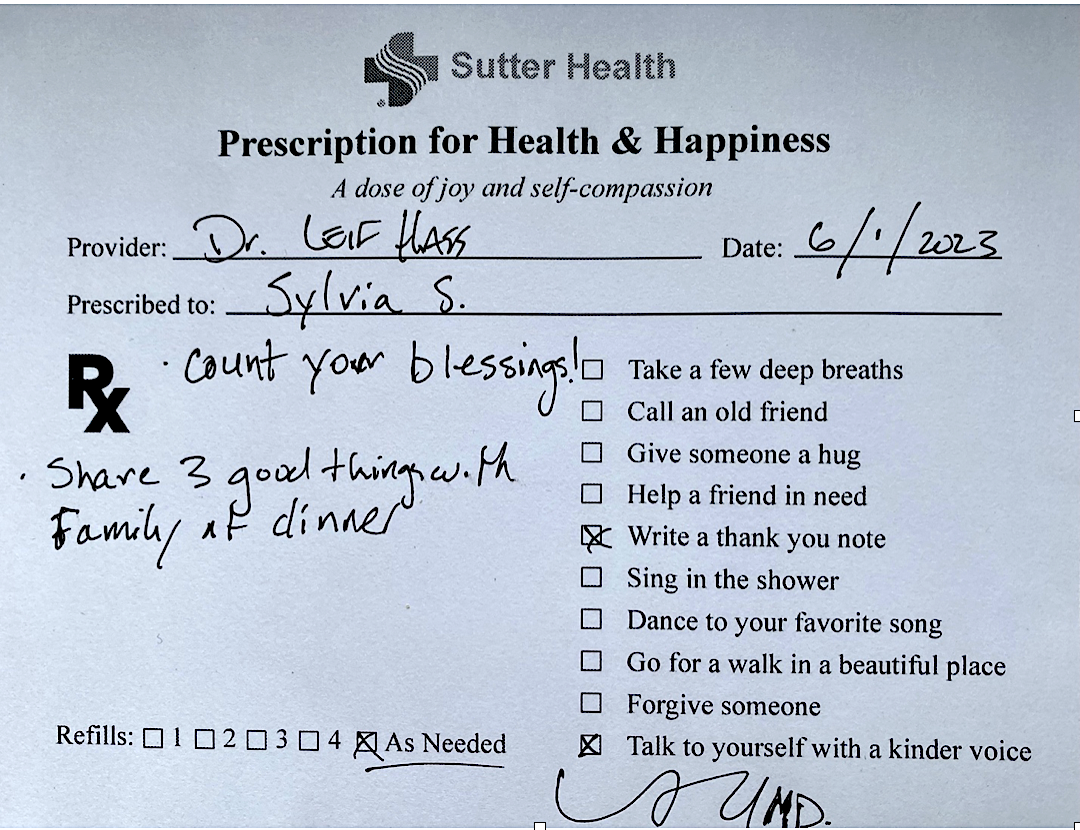“You worked hard to bring me right, mama, now it’s my turn,” said the daughter of Ms. T, next to her mother’s hospital bed. “I will do everything I can to get you back on your feet!” Her frail mother slowly opened her eyes and lovingly met her daughter’s gaze.

It was time for me to go. “It is such a privilege to do this work and to be involved in your care at this important time,” I said to them both. “Thank you.” A wave of emotion flowed through my body as I walked out of the room and I thought to myself, “It is a privilege to do this work. God, I love it!”
I was a pretty darn cynical med student and young doctor, but through encounters with people like the T family—and some guidance from resources at the Greater Good—I have learned to see much of my work as a doctor as a privilege and as a gift. I had thought the idea that “gratitude is good for us” was overhyped. Now, I see that gratitude really is good for me and for the people around me—in part because it has transformed my experience of work as a doctor.
I’d like to share with you what I learned about gratitude and how it can help us find profoundly rewarding emotional experiences.
Searching for what’s good
For its first 100 years, the field of psychology almost exclusively focused on psychopathology—what is wrong with the mind. Then in the ‘90s, a group of young California-based researchers started investigating healthy mental states—and the field of positive psychology was born. One of those researchers was Robert Emmons at the University of California, Davis. He convinced a group of prominent theologians to spend a few days with him to share how they conceived of gratitude, and to explore why it is at the heart of all our great religions and what it might bring to our daily lives.
A few years later, Emmons published his seminal paper on gratitude journaling, where participants were asked to write three gratitudes three times a week for six weeks. He found that six months later, people still reported greater optimism and well-being, as well as having better relationships with their partners. They also reported exercising more and having fewer physical complaints.
Since then, literally hundreds of other studies have confirmed and expanded on the psychological and physical benefits of gratitude—work extensively described in the 2020 book, The Gratitude Project: How the Science of Thankfulness Can Rewire Our Brains for Resilience, Optimism, and the Greater Good. The Roman philosopher Cicero called gratitude “the mother of all virtues,” and psychologist believe gratitude evolved as a social glue for a species that completely relies on teamwork for survival. They see gratitude leading to a “virtuous cycle” where:
- We recognize something of value coming from beyond ourselves;
- We receive the gift and acknowledge the source;
- The positive emotion associated with this process inspires us to “pay it forward”—and thus the cycle continues.
So why are we not all overflowing with gratitude all the time? That’s because of two other keys to our survival: finding threats and getting used to both the bad and the good. We all have an inherent “negativity bias,” constantly seeing things that are not going well or which we might improve upon. At the same time, “hedonic adaptation” leads us to stop seeing what is going well on a daily basis and instead focus on what is not. This combination of quotidian adaptation and threat-seeking can blind us to all that is going right every day.
Cultivating gratitude on the job
Over the last several years I have been working on ways to help my colleagues discover more gratitude while caring for patients in the hospital. Here are six ideas for cultivating more gratitude. While I’m aiming them at health-care providers, I think they can be used by anyone.
- Appreciate all that is going right! We don’t have to let humankind’s negativity bias rule the day. So much goes well in our lives we should recognize. In American hospitals, water flows from the tap, lights go on, the fridges are full of food from around the world. And we have medicines and equipment that were unimaginable for almost all human history. We should be grateful each time well-trained staff help our patients, a procedure goes smoothly, or we receive payment for work with patients who without aid could not afford health care.
- Slow down for just a few seconds. That’s all it takes for a deep breath to decrease our sympathetic tone. With the parasympathetic nervous system activated, the vagus nerve can create more visceral, felt sensations when we experience emotions like gratitude. When we feel emotions more profoundly, we have a greater appreciation for them and continue to seek them out.
- Remember, the real stories in health care are those of the patients. It is natural to focus on the role of the provider in health care because that is what we are doing. Our stories matter, of course, but the real story is the patient’s journey: how they and their families cope with failing bodies and their mortality. These existential episodes are the stuff of great dramas and our front row seat to these moments that define the human condition should be seen as a gift.
- Say thanks like you mean it. It is easy to get in the habit of offering a customer service-like thanks. Instead, I try to earnestly say what I said to Ms. T and her daughter: “It is truly a privilege to be involved in your care at this important time in your life. Thank you.” You can come up with a line that works for you. When you say it like you mean it, you will mean it and you will feel it strongly in your mind and body.
- See medicine as sacred work. Sacred means beyond the ordinary. Bringing people back from the brink of death; attending to dying patients; seeing the love, courage, and determination of patient and families as the body fails—ours is extraordinary work. Seeing the sacred nature of our work can turn it into a spiritual practice and an unending source of gratitude.
- Prescribe it! For our patients, gratitude can be a powerful medicine as they try to navigate the course of their illnesses. At discharge, I regularly prescribe a gratitude and other healthy cognitive concepts along with whatever medicines they need. I honestly think it can be more helpful than many of the pills we prescribe. And caring in this more personal way generates a sense of connection that benefits both parties. Personally, teaching about gratitude might be the most important part of my own gratitude practice. Give it a try.

This a great framework for those in healthcare foster gratitude, but it can be applied to everyone in the “people professions.” Our clients and students can all at times be seen as sources of gifts we can acknowledge.
More ways to give thanks
People use the term “gratitude practices” because practice helps. The more we flex our gratitude muscles—the more we strengthen positive neural pathways and neglect unhelpful ones—the better our health and outlook. If make practices of counting steps and carbs, we can do the same for other healthy behaviors like gratitude.
What are other ways to practice? Journaling may be the most powerful gratitude practice because of the way writing works on our neural processes, and many studies suggest that journaling can have a lasting impact on well-being. Or try this: At dinner with your family, share three good things that happened during your day; that’s a great way to draw kids into conversation, too.
Saying thanks doesn’t involve a lot of time. Mostly, what is needed is presence of mind or awareness. I’m a reasonably intelligent person, and it’s a little embarrassing to realize how self-absorbed and oblivious I was to the many of the small gifts life offers. Now I am always on the outlook for them because it’s there I find kindness, connection, and meaning. Today, I make it a habit of thanking everyone and everything: my patients, our staff, folks at the market, my family, the trees, the sun! Through thankfulness, I’ve discovered, we create connections, improve relationships, and calm our nervous systems.
And it’s become crucial for making medicine more sustainable for me. Health care is hard work: time pressures, bureaucracies, people trying to die! We need all the help we can get to find purpose, meaning and beauty in the work so we can thrive, and give our patients the care they deserve. My practice of gratitude puts me in a mental space to do this. It can for you, too.
To learn more about these prescriptions, please reach out: hassl@sutterhealth.org.










Comments